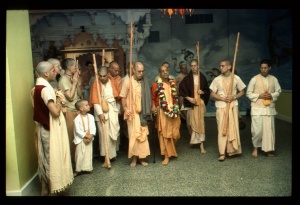CC Antya 4.184: Difference between revisions
m (1 revision(s)) |
(Vanibot #0054 edit - transform synonyms into clickable links, which search similar occurrences) |
||
| (One intermediate revision by one other user not shown) | |||
| Line 1: | Line 1: | ||
{{ | [[Category:Sri Caitanya-caritamrta - Antya-lila Chapter 04]] | ||
<div style="float:left">'''[[Sri Caitanya-caritamrta|Śrī Caitanya-caritāmṛta]] - [[CC Antya|Antya-līlā]] - [[CC Antya 4|Chapter 4: Sanātana Gosvāmī Visits the Lord at Jagannātha Purī]]'''</div> | |||
<div style="float:right">[[File:Go-previous.png|link=CC Antya 4.183|Antya-līlā 4.183]] '''[[CC Antya 4.183|Antya-līlā 4.183]] - [[CC Antya 4.185|Antya-līlā 4.185]]''' [[File:Go-next.png|link=CC Antya 4.185|Antya-līlā 4.185]]</div> | |||
{{CompareVersions|CC|Antya 4.184|CC 1975|CC 1996}} | |||
{{RandomImage}} | |||
==== TEXT 184 ==== | ==== TEXT 184 ==== | ||
<div | <div class="verse"> | ||
tomāre ‘lālya’, āpanāke ‘lālaka’ abhimāna | :tomāre ‘lālya’, āpanāke ‘lālaka’ abhimāna | ||
lālakera lālye nahe doṣa-parijñāna | :lālakera lālye nahe doṣa-parijñāna | ||
</div> | </div> | ||
| Line 12: | Line 16: | ||
==== SYNONYMS ==== | ==== SYNONYMS ==== | ||
<div | <div class="synonyms"> | ||
''[//vanipedia.org/wiki/Special:VaniSearch?s=tomāre&tab=syno_o&ds=1 tomāre]'' — unto you; ''[//vanipedia.org/wiki/Special:VaniSearch?s=lālya&tab=syno_o&ds=1 lālya]'' — maintained; ''[//vanipedia.org/wiki/Special:VaniSearch?s=āpanāke&tab=syno_o&ds=1 āpanāke]'' — unto Me; ''[//vanipedia.org/wiki/Special:VaniSearch?s=lālaka&tab=syno_o&ds=1 lālaka]'' — the maintainer; ''[//vanipedia.org/wiki/Special:VaniSearch?s=abhimāna&tab=syno_o&ds=1 abhimāna]'' — conception; ''[//vanipedia.org/wiki/Special:VaniSearch?s=lālakera&tab=syno_o&ds=1 lālakera]'' — of the maintainer; ''[//vanipedia.org/wiki/Special:VaniSearch?s=lālye&tab=syno_o&ds=1 lālye]'' — unto the maintained; ''[//vanipedia.org/wiki/Special:VaniSearch?s=nahe&tab=syno_o&ds=1 nahe]'' — not; ''[//vanipedia.org/wiki/Special:VaniSearch?s=doṣa&tab=syno_o&ds=1 doṣa]'' — fault; ''[//vanipedia.org/wiki/Special:VaniSearch?s=parijñāna&tab=syno_o&ds=1 parijñāna]'' — understanding. | |||
</div> | </div> | ||
| Line 19: | Line 23: | ||
==== TRANSLATION ==== | ==== TRANSLATION ==== | ||
<div | <div class="translation"> | ||
“My dear Haridāsa and Sanātana, I think of you as My little boys, to be maintained by Me. The maintainer never takes seriously any faults of the maintained. | “My dear Haridāsa and Sanātana, I think of you as My little boys, to be maintained by Me. The maintainer never takes seriously any faults of the maintained. | ||
</div> | </div> | ||
| Line 26: | Line 30: | ||
==== PURPORT ==== | ==== PURPORT ==== | ||
<div | <div class="purport"> | ||
When a father maintains a child and the child is maintained by the father, the father never takes seriously the faults of the child. Even if they actually are faults, the father does not mind them. | When a father maintains a child and the child is maintained by the father, the father never takes seriously the faults of the child. Even if they actually are faults, the father does not mind them. | ||
</div> | </div> | ||
__NOTOC__ | |||
<div style="float:right; clear:both;">[[File:Go-previous.png|link=CC Antya 4.183|Antya-līlā 4.183]] '''[[CC Antya 4.183|Antya-līlā 4.183]] - [[CC Antya 4.185|Antya-līlā 4.185]]''' [[File:Go-next.png|link=CC Antya 4.185|Antya-līlā 4.185]]</div> | |||
__NOTOC__ | |||
__NOEDITSECTION__ | |||
Latest revision as of 20:33, 19 February 2024
Śrī Caitanya-caritāmṛta - Antya-līlā - Chapter 4: Sanātana Gosvāmī Visits the Lord at Jagannātha Purī

His Divine Grace
A.C. Bhaktivedanta Swami Prabhupada
A.C. Bhaktivedanta Swami Prabhupada
TEXT 184
- tomāre ‘lālya’, āpanāke ‘lālaka’ abhimāna
- lālakera lālye nahe doṣa-parijñāna
SYNONYMS
tomāre — unto you; lālya — maintained; āpanāke — unto Me; lālaka — the maintainer; abhimāna — conception; lālakera — of the maintainer; lālye — unto the maintained; nahe — not; doṣa — fault; parijñāna — understanding.
TRANSLATION
“My dear Haridāsa and Sanātana, I think of you as My little boys, to be maintained by Me. The maintainer never takes seriously any faults of the maintained.
PURPORT
When a father maintains a child and the child is maintained by the father, the father never takes seriously the faults of the child. Even if they actually are faults, the father does not mind them.